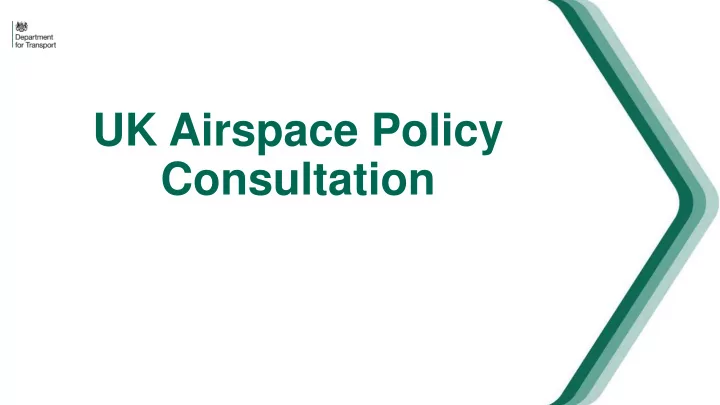

UK Airspace Policy Consultation
Contents Introduction Benefits of Airspace Modernisation Territorial extent How we got here Changes to airspace Compensation in airspace change Making transparent airspace change decisions Assessing aviation noise Ongoing noise management
Introduction Economic benefits UK Technology & economy / passengers / environmental controls noise impacts Engagement • Our proposals set the overarching framework for governing airspace decisions • Our role is not to determine individual airspace arrangements • The framework will ensure decisions are made in the right way, ensuring there is: Balance and Transparency Consistency in how impacts are mananged Also published: • Draft Air Navigation Guidance • Rationale for Airspace Modernisation • Survey of Noise Attitudes
Benefits of Airspace Modernisation • Procedures and infrastructure around airspace have remained largely unchanged for around 50 years. • Government supports sustainable aviation, which must balance the benefits of a thriving aviation sector with impacts on local communities and the environment. A key part of this is airspace modernisation, releasing benefits such as: Increased Capacity Reduced Delays Cuts to per flight aviation emissions and fuel savings Reduced noise from aircraft overflying communities Enhancements to aviation safety
Territorial Extent • Aviation and airspace are reserved matters • Our proposals are therefore applicable to the whole of the UK • ICCAN would be a nationwide body • Noise policy proposals, based on Noise Policy Statement for England shall apply where relevant to airspace matters • We are consulting on ICCAN’s remit beyond airspace change with devolved administrations through this consultation • Proposals relating to how noise is managed at individual airports will be for devolved administrations to formulate policy
How we got here • Feedback over the last few years – including on recent airspace changes • Progression of airspace modernisation • Thinking developed through focus groups in 2016 Consultation: We would welcome your feedback to inform our decisions going forward
Changes to Airspace 3 Tiers of Change – proportionate processes for each appropriate scrutiny and transparency Tier One Tier Two Tier Three Changes to Planned and Changes to permanent permanent operations structure of UK changes to Air airspace Traffic Controller’s procedures
Compensation Four proposed changes to current policy: Remove word ‘development’ in terms of financial assistance to bring in line with compensation for new infrastructure. Amend wording so assistance to insultation 63 dB LAeq + regardless of the level of change Add wording to encourage consideration of compensation for significantly increased overflight Requirement of full insulation paid by the airport for homes 69dB LAeq + contour
Making Transparent Airspace Change Decisions We propose: • Options analysis • Local engagement/consideration of route options • Transparency over balancing of different factors, including environmental Assessing noise: • Threshold for impacts to be considered • New methodology - impacts on health and quality of life • Use of other metrics for frequency
Independent Commission on Civil Aviation Noise ICCAN: Ensure transparency, trust and local engagement in airspace decisions and noise management ICCAN’s proposed functions: • Advise on the best noise management techniques • Advise on accessibility of noise information to facilitate community engagement on airspace proposals • Influence through best practice guidance • Review recent research and commission further research • Lead option – independent body within CAA • Public funding • Reviewed after 5 years
Ongoing Noise Management We believe noise is usually best managed at a local level: • Decisions on operating restrictions should be made through the planning process where possible. • The competent authority for ensuring these follow the Balanced Approach will be the planning decision-maker, or CAA outside of planning. • The designated airports should be given more power to respond to noise problems facing their communities.
Next steps • We are looking for your input and feedback on our proposals in order to inform our final proposals • Please come and talk to us more about our proposals and we strongly encourage you to fill in a response form with your thoughts • The deadline for responses is 25 th of May. We will be looking to announce our government response in Autumn You can respond online: ukairspacepolicy.dialoguebydesign.com Via email: airspace.policy@dft.gsi.gov.uk Or by post: Freepost UK Airspace Policy Consultation
Recommend
More recommend